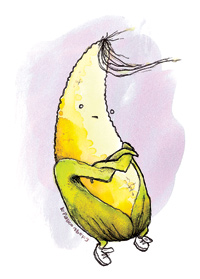 by Michael Boyette | illustration by Katie Falkenberg
by Michael Boyette | illustration by Katie Falkenberg
My neighbor is standing at my back fence, looking at my ripening tomatoes. “I wanted to ask you something,” he says. “Every year, you work so hard to grow them. So why don’t you ever pick them?”
Hmmm… I was hoping nobody had noticed.
I could tell him I’d been too busy. I could tell him it’s my way of tithing. I could tell him I believe in leaving something for the squirrels and birds.
But the truth is, I just don’t like to harvest.
I love the turning of the beds, the planting, the waiting, the sprouting, the watering, the weeding. Yet when it comes time to pull the trigger, I flinch.
Half my spinach runs to seed. Pea pods turn from green to yellow to papery gray. Cucumbers bloat up like old ladies’ feet. Tomatoes sag and tear and bleed, begging to be put out of their misery.
Am I suffering from a psychological condition? If so, what is it called? Harvest anxiety? Overripatosis? Pickophobia? I’ve looked on the Internet and couldn’t find anything. But I’m not the only one who feels this way—Novella Carpenter, an urban farmer in Oakland, CA, writes of the grief that seasoned her first homegrown Thanksgiving dinner. She’d made the mistake of naming her turkey Harold.
I would never name a tomato Harold. A tomato is not a pet.
It’s more like a child.
In the spring, you set the tiny vine carefully in the trench and wrap it up in a blanket of compost. You lie awake as it spends its first night out from under your roof, at the mercy of whatever sluggy slimy predator happens along. You watch and worry and hover and fuss, until one day there’s a tomato, red and ripe and perfect, glowing against the dark green vine.
That’s the worst moment of the season.
Because the instant you pick that first tomato, it’s over. The rest is just a long downhill slide toward autumn.
At least tomatoes have the decency to humor you with an extended childhood. Corn is even crueler. It grows too fast. There are days in July when you go to work and it’s looking up at you like a three-year-old, and then by the time you get home it’s calling you old man and accusing you of selling out.
And unlike tomatoes, corn comes ripe all at once. You must salvage whatever sweetness you can as quickly as possible. For a time, you are buried in it. Corn for breakfast. Corn for lunch. Corn for dinner. Corn for a midnight snack. You get fed up. Then it’s gone—packed up, out the door and off to Corn College.
When I think of corn, I remember a certain August day when my children were not quite ripe. On that day, it felt as if they’d be young forever—an endless summer of possibility. We’d driven into the countryside, doing the kinds of things that children still found magical—riding rides and buying toys and viewing small-town wonders—and now we were coming home.
The road was hilly and twisty, and we kept expecting to see a barn or a house or a billboard. But all we saw was corn. The stalks stretched away in all directions in soft green waves. The setting sun lit the pollen-filled air. It was so beautiful. Mom, Dad, Josh, Sarah, Dan. Crowded into our little car like peas in a pod. We were together. We were happy. The day was full and perfect. The harvest was yet to come.

